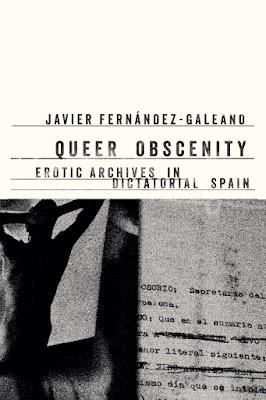Javier Fernández-Galeano, contratado Ramón y Cajal en la Universidad de Valencia y miembro del grupo HUM-536, acaba de publicar en Stanford University Press la monografía titulada Queer obscenity. Erotic Archives in Dictatorial Spain, donde se evidencia de qué manera los archivos de la represión y la censura de la homosexualidad y la pornografía en las dictaduras de Primo de Rivera y Francisco Franco, nos han legado paradójicamente un imponente depósito de materiales eróticos vinculados no tanto al mundo hetero como al de la disidencia sexual. El libro arroja nueva luz acerca de la producción, consumo y circulación de la pornografía y de la cultura material del erotismo en la España del siglo XX. Se reproduce debajo el resumen del contenido:
Under Spain's twentieth-century dictators, state agents not only censored, eradicated, and attempted to prevent the circulation of obscenity, but also contradictorily engaged in curation and even restoration initiatives that have bequeathed us an extensive queer pornographic archive. Javier Fernández-Galeano takes us inside the archive to demonstrate how the incongruities of the Primo de Rivera (1923–1930) and Franco (1939–1975) regimes were manifested in the regulation of erotic material cultures. The dictators' authorities destroyed "straight" pornographies while often curating and preserving "queer" erotica. While reproductions of the masterpieces of Tintoretto, Michelangelo and Botticelli were incinerated to avoid their "deviant" effects, judicial authorities could repeatedly attend the screening of an amateur film showing a gay threesome without acknowledging the irony: their concern was not that obscene material was consumed, but rather by whom
Focusing on amateur pornographers and their confiscated and censored erotica, this book adds a rich complexity to both the history and theory of pornography, demonstrating that surveillance depends entirely on documenting intimacy and preserving transgression. This book sheds new light on the production, consumption, and circulation of pornography and erotica in Spain over the course of the twentieth century, drawing connections between intimate queer desires, preservation, and erasure.

No hay comentarios:
Publicar un comentario